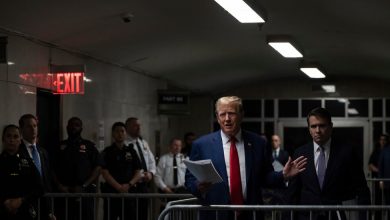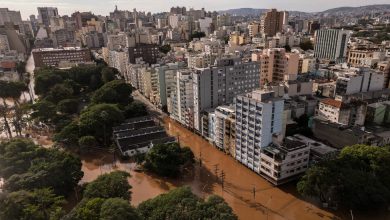In Warning to Taiwan, China Announces Military Patrols

China’s military said it would stage “joint combat readiness” patrols around Taiwan on Saturday, sending a warning gesture to the island democracy soon after a leading candidate in Taiwan’s presidential election finished an overseas trip that Beijing had denounced.
Vice President Lai Ching-te, the candidate, had flown to Paraguay — one of 13 states that keeps diplomatic relations with Taipei, and not Beijing — making stops in the United States on his way there and back. The Chinese government is trying to curtail the international activities of Taiwan, which it claims as its own territory. It especially objects to Taiwanese leaders’ visits to the United States, the island’s most important political and military supporter.
Before and during Mr. Lai’s six-day trip, Chinese officials and media criticized him. He is the presidential candidate of Taiwan’s ruling Democratic Progressive Party, which favors asserting Taiwan’s distinctive identity and sovereignty — a position that Beijing condemns as threatening its claim to the island.
Mr. Lai returned to Taipei early Friday. The following morning, Senior Col. Shi Yi, a spokesman for the Eastern Theater of the People’s Liberation Army, announced the joint air and sea exercises for that day.
“This is a serious warning against provocations by the separatist forces of ‘Taiwan independence’ in collusion with external forces,” Colonel Shi said, according to the announcement issued by the official Xinhua news agency.
What is China’s aim with these military activities?
The patrols do not mean that China is about to launch a conflict but are a way of threatening Taiwan and wearing away its military forces.
The Chinese military announcement provided no details about the scale and location of the patrols, but they appeared to be relatively limited. On Saturday morning, the Taiwanese Ministry of National Defense said it had detected nine Chinese military aircraft and six naval vessels around Taiwan over the previous 24 hours.
The ministry condemned the Chinese military patrols. “This military exercise launched on a pretext will be of no help to peace and stability in the Taiwan Strait, and it highlights its militaristic and bellicose mentality,” it said of the Chinese Communist Party leadership.
Since then-Speaker Nancy Pelosi visited Taiwan last August, China has intensified its military incursions around Taiwan. In April, after President Tsai Ing-wen of Taiwan met with Speaker Kevin McCarthy in California, China launched large-scale military drills near Taiwan by sending record numbers of military aircraft and ships.
Who is Mr. Lai, and why does Beijing oppose him?
Since 2000, the Taiwanese vice presidents have made 11 transits through the United States, but none of the trips has been as strongly condemned by China as Mr. Lai’s this time.
Mr. Lai, 63, a former doctor and the Democratic Progressive Party’s chairman, is leading in polls for the presidential election, which takes place in January. He emerged from a wing of his party that has pressed Taiwan’s aspirations for sovereignty, and he has previously called himself a “pragmatic worker for Taiwanese independence.”
But as Mr. Lai vies to succeed President Tsai, who must step down after two terms, he is seeking to assure voters that he will maintain continuity. He has said that his comments about being a “pragmatic worker” meant that he wanted to more fully exercise Taiwan’s current sovereignty.
What is likely to happen next?
So far, China’s response after Mr. Lai’s visit appears more muted than it was in April, when President Tsai passed through the United States, or last August, when Ms. Pelosi visited Taiwan.
Chinese leaders may grasp that menacing, large-scale maneuvers around Taiwan could work in Mr. Lai’s favor by pushing more support to his party and away from the opposition Nationalist Party, which favors broader ties and dialogue with Beijing. In Taiwan, neither military officials nor the public seemed especially worried about the latest Chinese military announcement.
Additional reporting by Chris Buckley




